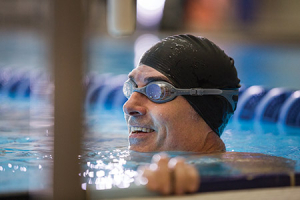Local athlete, Joe Quercio is back in action after facing a major setback – cardiac arrest.
By Andrea Nagel
 When your heart is strong enough to get you through 140.6 miles of running, biking and swimming, a heart attack is the last thing you expect to experience. Despite his stellar cardiovascular health, that’s exactly what happened to Joe Quercio; proving that cardiac arrest really can happen to anyone.
When your heart is strong enough to get you through 140.6 miles of running, biking and swimming, a heart attack is the last thing you expect to experience. Despite his stellar cardiovascular health, that’s exactly what happened to Joe Quercio; proving that cardiac arrest really can happen to anyone.
“There were no real warning signs,” Joe recalled of the weeks leading up to his cardiac event. “I woke up with massive chest pain and shortness of breath, I just tried to go back to sleep.”
Once awake, Joe began to feel more unusual symptoms. His left arm began to tingle; he started having what seemed like acid reflux and generally just didn’t feel well. Remembering a similar incident a friend and training partner experienced, Joe fought his denial and decided it was time to go to Kootenai Health’s emergency department.
“All the way there I kept thinking, ‘This isn’t supposed to happen to me,’” he said.
Joe said everyone he encountered at the ED was surprisingly calm.
“When you check in to the ED saying you think you may be having a heart attack, you expect to hear alarms and see people rushing to take you back to surgery. But none of that happened. The fact that everyone one was calm and normal put me at ease.”
Test after test revealed nothing. Joe’s vital signs were all normal and he was far from the usual candidate for a heart attack. The emergency staff even considered sending him home. Luckily they called in Michael Williams, M.D., with Heart Clinics Northwest to come and further evaluate Joe’s condition.
“All Joe’s tests, including his EKG, came back with no abnormalities,” Dr. Williams said. “It took longer than expected to diagnose his heart attack.”
Dr. Williams decided to give Joe a CT scan – a method only used by a couple physicians in the Inland Northwest. Using CT scans as a diagnostic tool is a fairly new concept. The technology is now fast enough to capture the image of arteries and see blockages.
“I started the CT program at Kootenai about a year ago,” Dr. Williams said. “It really should be used more.”
The CT scan allowed for a faster diagnosis over traditional methods. If Dr. Williams had decided to do a treadmill test, Joe would have had to wait over 24 hours to see the results. By then, his heart attach could have passed. Instead, Dr. Williams was able to get results almost instantly and see that one of Joe’s arteries was completely blocked.
“At that point Dr. Williams called the cath lab so it would be ready and they rushed me back for surgery,” Joe said.
Joe’s surgery was successful, but not without its challenges. Joe’s nurses explained to him the blockage in his arteries was hard to break, and at one point in time he went into full cardiac arrest. An event he actually remembers.
“When you’re on the table you’re conscious and mostly awake,” he recalled. “At one point I saw the look on one of the nurse’s faces change and everything went quiet. I knew something was wrong. But just a few seconds later everything seemed normal again.”
In the days and weeks following his surgery, Joe gradually began working his way back to his normal activity levels. Looking back on his experience, Joe said he feels lucky so much worked in his favor.
“Everyone said my lifestyle had a big impact on my outcome,” Joe said. “That coupled with the fact that I recognized I was having heart problems and got to the hospital on time and that I was an ideal candidate for the CT scan all helped save my life. The care I received from everyone at Kootenai was amazing.”
Joe is currently training for the 2014 Ironman Coeur d’Alene and expects to finish thanks to the care of Dr. Williams and his team; proving anything is possible with the right team and a heart of an Ironman.
CTA: Cheer Joe on at the 2014 Coeur d’Alene Ironman, bib number 610. For more information, call the Heart Clinics Northwest office at (208) 676-9913 or visit kh.org/hcnw.



